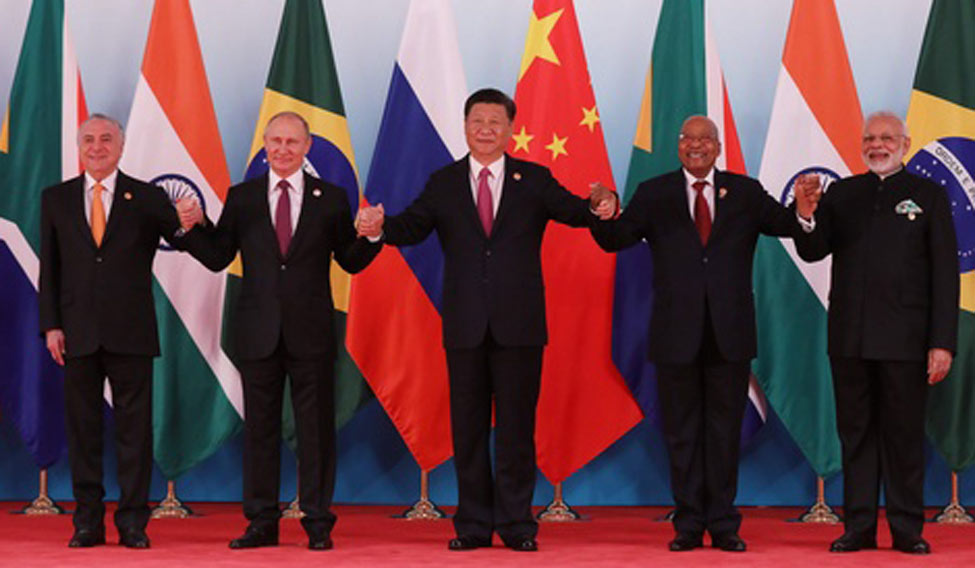The BRICS on Monday sought decisive action against Pakistan-based terror outfits like the LeT and the JeM as well as the Taliban, ISIS and al-Qaeda, as it asked all states to prevent terror activities from their soil and curb terror financing.
In the Xiamen Declaration issued at the end of the BRICS Summit's plenary session, the influential grouping—comprising Brazil, Russia, India, China and South Africa—called upon the international community to establish a "genuinely broad" international counter-terrorism coalition.
It reaffirmed that those responsible for committing, organising, or supporting terrorist acts must be held accountable and sought expeditious finalisation and adoption of the Comprehensive Convention on International Terrorism (CCIT) by the UN.
Secretary East in the External Affairs Ministry Preeti Saran said all BRICS leaders, speaking at the summit, voiced serious concerns over terrorism.
At a restricted session of the BRICS leaders, Prime Minister Narendra Modi also articulated India's position on the issue and offered to host a conference on de-radicalisation.
Talking about India's position on terrorism, Saran told reporters at a briefing that, "Terrorism is a scourge that has to be addressed collectively by the entire international community. And, I think, increasingly there is a realisation that you cannot have double standards in tackling this scourge."
"You cannot have good and bad terrorists. It is a collective action," she said.
The BRICS declaration said the grouping deplored all terrorist attacks worldwide, including attacks in BRICS countries, and condemned terrorism in all its forms and manifestations wherever committed and by whomsoever.
It stressed that there can be no justification whatsoever for any act of terrorism.
"We, in this regard, express concern on the security situation in the region and violence caused by the Taliban, ISIS, al-Qaeda and its affiliates including the Eastern Turkistan Islamic Movement, Islamic Movement of Uzbekistan, the Haqqani network, Lashkar-e-Taiba (LeT), Jaish-e-Mohammad (JeM), TTP (Tehrik-i-Taliban Pakistan) and Hizb ut-Tahrir," the BRICS declaration said.
The BRICS also called upon all states to prevent financing of terrorist networks and terrorist actions from their territories.
"We call upon the international community to establish a genuinely broad international counter-terrorism coalition and support the UN's central coordinating role in this regard," it said.
The grouping also stressed on the need for increasing the effectiveness of the UN counter-terrorism framework, including in the areas of cooperation and coordination among the relevant UN entities, designation of terrorists and terrorist groups.
"We call upon all nations to adopt a comprehensive approach in combating terrorism, which should include countering radicalisation, recruitment, movement of terrorists including Foreign Terrorist Fighters, blocking sources of financing terrorism," said the declaration.
The challenges identified by it included containing supply of weapons, drug trafficking and dismantling terrorist bases, and countering misuse of the internet including social media by terrorist entities.
"We are committed to prevent and counter the growing spread of terrorist narratives, and to tackle all sources, techniques and channels of terrorist financing," it said.
Highlighting the primary leading role and responsibility of states in preventing and countering terrorism, the grouping emphasised on the necessity to develop international cooperation, in accordance with the principles of international law, including that of sovereign equality of states and non-interference in their internal affairs.
The BRICS also strongly deplored the nuclear test conducted by North Korea.
"We express deep concern over the ongoing tension and prolonged nuclear issue on the Korean Peninsula, and emphasize that it should only be settled through peaceful means and direct dialogue of all the parties concerned," the BRICS said.





